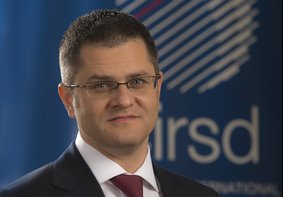
Opening Remarks to the International Conference on the “European Tragedy of 1914 and the Multipolar World of 2014: Lessons Learned” by H.E. Mr. Vuk Jeremić, President of the Center for International Relations and Sustainable Development (CIRSD)
Excellencies,
Distinguished Guests,
Ladies and Gentlemen,
On behalf of the Center for International Relations and Sustainable Development, I would like to welcome you to this conference, entitled the “European Tragedy of 1914 and the Multipolar World of 2014: Lessons Learned.”
It is an exceptional honor for our think-tank to host such a distinguished gathering of renowned historians and experienced policymakers from around the globe.
Thank you for joining us in Belgrade on this most special occasion.
____
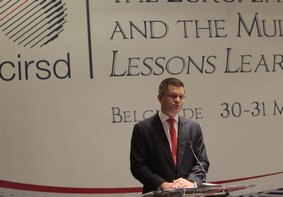
The First World War is no doubt a pivotal event of the modern era. Notwithstanding the vast transformations that we have undergone since, this great conflict remains what Winston Churchill called “a drama never surpassed.”
I believe that our contemporary need to understand the Great War, however, has deeper reasons than mere superficial curiosity or academic interest. Our present circumstances are intimately related to the past hundred years—a historical trajectory shaped by what happened between 1914 and 1918 in far-reaching, not always fully appreciated ways.
Ladies and Gentlemen,
Soon after the “great black tornado”—in Theodore Roosevelt’s memorable phrase—had run its destructive course across Europe, it became clear that the social forces unleashed by the carnage could not be contained for long within a reconstituted, yet inherently fragile international order.
For a brief moment after the 1917 February Revolution in Russia, it might have been hoped that the anticipated victory of the powers of the Entente would result in a clear-cut victory for liberal democracy. But this illusion was soon shattered by the success of the Bolsheviks, and the barely contained social unrest in Weimar Germany.
The rise of Mussolini in 1922, the emergence of National Socialism in the late-1920s, and gradual shifts towards totalitarianism in many parts of the Old Continent by the mid-1930s, demonstrated that fascism was as much a beneficiary of the First World War as the radical Left.
The Spanish Civil War was a potent symbol of this state of affairs. For the first time in modern European history, the Enlightenment values of liberal democracy played at best a secondary role in a major conflict. The essential contest turned out to be the one between the proponents of the zealous Left and the adherents of the totalitarian Right, following the relegation of the philosophies of the likes of Locke and Montesquieu to the intellectual wasteland by the brutality of the Great War.
This is a conclusion confirmed rather than qualified if we for a moment leave the world of politics and ideology and consider the literature of high Modernism that came into its own in the years after the First World War.
Radical ideas had manifestly much more appeal for the most significant writers of that period, than the humane values embraced by many of the great 19th-century authors and their early 20th-century followers. Yeats, Eliot and Pound in England, Benn and Jünger in Germany, Céline in France—to mention only some of the most important names—were attracted to the thoughts and moral outlook of the extreme Right. Similarly, writers such as Brecht in Germany, Mayakovsky in the Soviet Union, and the Surrealists in France and elsewhere became more or less convinced followers of the anti-bourgeois Left—increasingly identified during the 1930s with Marxism.
They never reverted to the liberal outlook of the pre-1914 world; theirs remained an altogether darker universe, open to violence in many of its forms.
The long shadow cast by the Great War engulfed all but the most sober of minds: Thomas Mann in Germany, Paul Valéry in France, Virginia Woolf in Britain. They became the isolated torchbearers of liberal continuity.
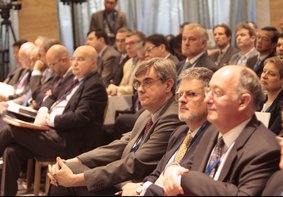 Ladies and Gentlemen,
Ladies and Gentlemen,
In many obvious ways, the First World War set the stage for the Second, which was instigated by Hitler in part to overturn the Versailles settlement and achieve some of the same goals pursued a generation earlier.
It was the “calamity from which all other calamities sprang,” as one prominent German-American historian has written. Indeed, the appalling disregard for human life and the transgression of moral limits practiced with unimaginable ferocity during the Second World War seem to find their point of origin in the First. It is no accident that de Gaulle called it a “war of extermination,” condemning World War I as perhaps the most disastrous turning point in modern history.
All these horrors—it is sometimes claimed—might have been avoided if the Great Powers had not taken up arms in 1914.
However, our grasp of counterfactual thinking on such a large scale is, in my view, too uncertain to pronounce with confidence. Those who reflect in this manner often tend to give less importance to the question of the causes of the First World War. They feel that with a disaster of such proportions—and such far-reaching consequences—everyone who was in any way a protagonist must share at least some essential responsibility for the resulting catastrophe. To attempt to discriminate between the powers and the political personalities involved—and assign greater causal influence to some rather than others—would be, in their view, to miss the point: to underestimate what we now see was at stake, and so fail to learn the real lesson of the Great War.
However, this attitude—psychologically understandable as it is—seems to me not only difficult to defend as a matter of principle, but also less than useful for those who seek to avoid repeating the mistakes of the past.
Ladies and Gentlemen,
The tensions and crises in regions far and wide—which are such a pronounced feature of the present day—are not so unlike those of the early 20th-century multipolar world.
Then, as now, we had a constant interplay of domestic and international factors rendering the resolution of specific conflicts difficult and, when achieved, often extremely unstable.
Then, as now, the underlying intentions of the most important players were sometimes opaque to one another and to other actors, making for a lack of trust and insufficient commitment to achieving compromise solutions.
Then, as now, there was more than enough room for single-minded pursuits of particular goals, potentially serving as triggers for violent clashes on a much wider scale.
And then, just as now, vigorous attempts were made at manipulating public opinion to believe in the belligerence of others and the peaceful intentions of one’s own side.
That is why today it seems to me both misconceived and short-sighted to concentrate exclusively on the overall horror of the First World War, and the role it played in the tragedy that engulfed humanity in September 1939.
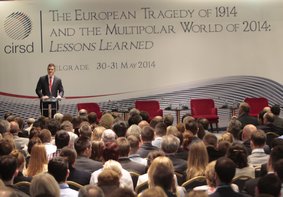 Ladies and Gentlemen,
Ladies and Gentlemen,
I believe we need to take a fresh look at the events leading to the July Crisis of 1914, as well as the Crisis itself, in order to examine a type of global situation that is still very much with us today.
The goals and motives of specific actors are as much a part of what has to be understood as the facts of economic strength or military capability. Miscalculation, misperception, and the adoption of maximalistic goals seem to be a feature of our times—just as they seem to have been in the years leading to the July Crisis, and during the Crisis itself.
Ukraine, of course, is the theatre where this is perhaps most clearly seen today.
Less than a month before the Sochi Winter Olympic Games began in early February, the World Economic Forum released its 2014 Global Risks report. The word ‘Ukraine’ did not appear at all—an apt illustration of the fact that the crisis came about virtually without warning, chillingly reminiscent of the situation we had a century ago.
Everyone appears to be worse off today than at the turn of the year, when irresponsible leadership placed Ukraine in the untenable position of having to choose between East and West—despite being perfectly obvious that there can be no political and economic sustainability without the country being able to work closely with both.
Ukraine’s citizens now face a prolonged period of internal disruption that will make the recovery far more difficult to achieve. With paramilitaries now strong in many places in both eastern and western Ukraine, any agreement on the future of the country will be much harder to reach.
The EU and Russia are experiencing a deterioration of their political ties, with clearly negative impact on their respective economies.
Even the United States—which at first glance appears not to be terribly affected by the situation in Ukraine—might face some unwelcome consequences once the wider international picture is taken into account.
The trust between the U.S. and Russia has largely disappeared, having been replaced by mutual suspicion and reciprocal feelings of contempt. In an atmosphere suddenly reminiscent of the Cold War, cooperation on many issues in the UN Security Council could prove much harder, or even impossible to achieve.
Ladies and Gentlemen,
In recent times, Washington and Moscow had worked together on at least two important Middle Eastern issues: the tragedy of Syria, and the Iranian nuclear program.
Limited progress on both fronts had been achieved, and a framework for concordant action established.
It seems improbable that such arrangements will keep their present form, however.
Barring some wholly unforeseen development, the Syrian conflict will continue unabated, while the prospects for a successful completion of the Iranian negotiations will probably dim—increasing the specter of a nuclearized Middle East.
Gains on other fronts could also be much harder to come by, as the foundation of the Middle East’s state system—injuriously set in 1916 by the Sykes-Picot agreement—may become prone to further weakening. This could produce fresh crises of central authority in a number of countries in the region.
It may also exacerbate longstanding frictions between Sunni and Shi’a across the Fertile Crescent. And this will probably escalate existing conflicts between proxies, and give additional impetus to extremist non-state actors and radical political movements.
Under such circumstances, prospects for reviving the Israeli-Palestinian peace process will further wane. This could lead to a prolonged period of belligerence, characterized by unilateral moves and reactions.
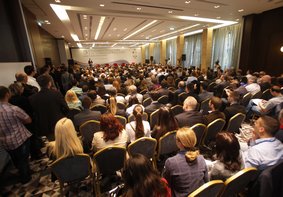 Ladies and Gentlemen,
Ladies and Gentlemen,
It has become commonplace to identify the forthcoming era as the Asian Century.
This is the region whose political, economic, social and environmental impact on the world has the potential to be as determinant as Europe’s in former times. Understanding Asia’s strategic trajectories has never been more relevant to global security and prosperity.
For the foreseeable future, Asian developments will be strongly influenced by the changing dynamics in the U.S.–China–Russia triangle.
The clear benefits for these powers to strengthen cooperation in Asia, combined with the logic of Mutually-Assured Destruction, make it unlikely that ongoing tensions between them may spiral fully out of control, although this possibility should not be dismissed outright.
Washington, Beijing and Moscow seem set to intensify the application of a ‘competitive cooperation’ strategy. But in doing so, they will need to carefully guard against the hazard of being instrumentalized by local actors. This is especially important in light of the absence of an inclusive form of regional security architecture.
Perhaps a victim of its own success, the region is now less stable than it has been for quite some time. Until recently, most Asian countries were chiefly preoccupied with strengthening their state institutions and generating economic growth. Continued progress in these areas, however, is yielding to bellicose rhetoric and romanticized narratives of the past.
The significant buildup of national military capabilities has resulted in an unprecedented regional arms race, with Asia’s share of military imports now comprising more than forty percent of the world’s total—up from fifteen percent just two decades ago.
The escalation of conflicting territorial claims throughout the region—combined with the constant threat posed by a possible showdown on the Korean peninsula—remain sources of great concern.
Given Asia’s significance for the world economy, any recourse to arms—however limited in scope or scale—would surely take a toll on growth and stability throughout the globe.
Ladies and Gentlemen,
More blood has been shed by the hands of man over the past century than in any previous one in the long and tumultuous history of our race.
Close to two hundred million people were killed on the fields of battle or through brutal schemes of tyrants and oppressors.
In so many corners of the globe, we took to one another with astounding ferocity—recklessly casting the die over and again in the selfish pursuit of particular advantage.
This is the heavy bequest we must carry forth, as we seek to address the sempiternal challenges to peace and security in a 21st-century environment characterized by interdependence, multipolarity, and globalization.
The risk of massive destruction is now greater than ever before, for the technological innovations of the past hundred years have allowed for the large-scale availability of the deadliest weapons of war.
But in our times, humanity faces an additional danger—an existential crisis unlike any the world has experienced so far: the rapid physical deterioration of the Earth itself.
Despite some loud protestations to the contrary, the evidence is truly overwhelming: mankind is the primary cause of global warming and climate change. We are the reason the environment has been ravaged—why oceans keep rising and acidifying; freshwater reserves depleting; droughts worsening; forests burning; many plant and animal species going extinct; and torrential rains becoming commonplace.
And I’m afraid this is not going to stop; it will keep getting worse and worse. Everywhere we look, we can see the enormous effects of the planetary emergency that is playing out right before our eyes. It increasingly affects every nation, and none can hope to solve this challenge on their own.
In order to address it, we will need to embrace a new form of cooperation—beset by a series of concurrent, aspirational and bold measures—coordinated at the highest level by leaders who understand the imperative of putting sustainable development at the heart of the conduct of international relations in the 21st century.
Such is the core idea of the UN Post-2015 Agenda: to profoundly change how we conceive and execute our economic, social, and environmental affairs at the national, regional, and global levels.
Nothing so ambitious has ever been tackled through multilateral diplomacy.
A decision to fully harness the unique convening power of the United Nations will have to be made—and leading statesmen will need to get personally involved for this global initiative to succeed. For all its imperfections, the UN is the sole international institution of indisputable legitimacy; it has to become the functional center for harmonizing mankind’s response to a threat far more insidious than any faced in history.
We must strive to bring to pass, with urgent determination, a new global compact—one that at long last steps beyond the shadow cast by the Great War over the world for the past hundred years.
We must make the generational choice to concern ourselves in earnest with advancing the common good—ceasing to misalign our own short-term priorities with the world’s long-term needs; and so informed, attend to our generation’s highest call: unifying around a common agenda for human betterment, and shaping the peaceful transformation of raison d’état into raison de planète.
Thank you very much for your attention.











